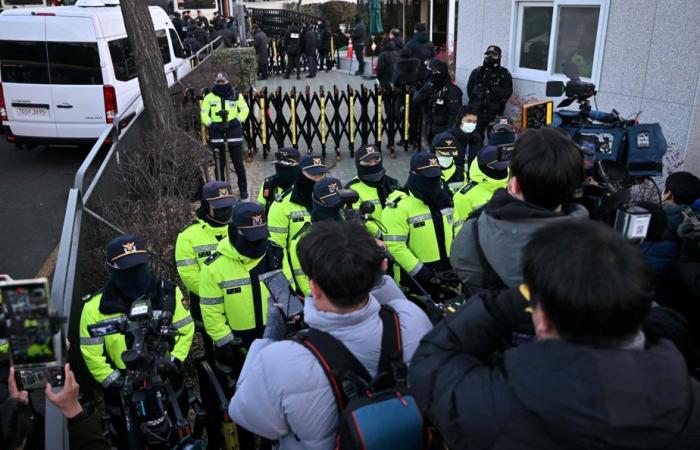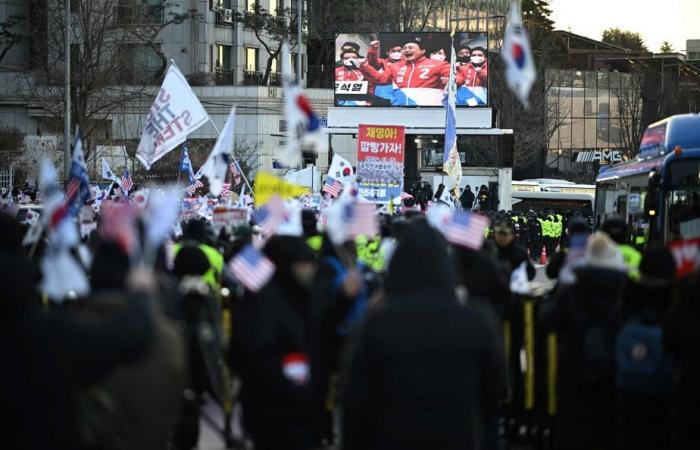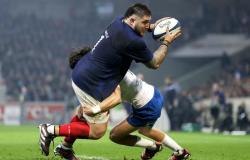(Seoul) South Korea’s Senior Corruption Investigation Office (CIO) announced Friday that it had “started executing an arrest warrant” against ousted President Yoon Suk-yeol for his failed attempt to impose the martial law, but according to media reports they were blocked inside the presidential residence by an army unit loyal to the leader.
Posted at 6:38 p.m.
Updated at 7:50 p.m.
Hailey JO
Agence France-Presse
“The execution of the arrest warrant against President Yoon Suk-yeol has begun,” announced the Corruption Investigation Office (CIO), which is centralizing the investigation for “rebellion” against him. But according to the Yonhap news agency, the IOC agents were “blocked by a military unit inside.”
AFP journalists had previously seen one of the IOC prosecutors accompanied by several other people cross the imposing security barrier set up in front of the presidential residence around 8 a.m. local time (6 p.m. Eastern time).
An arrest of Yoon Suk-yeol, who officially remains the head of state and is only suspended pending confirmation by the Constitutional Court of his dismissal by mid-June, would be unprecedented in the history of South Korea.
“The execution of the arrest warrant is illegal and invalid,” said the leader’s lawyer, Yoon Kap-keun, announcing a new legal action to block this execution, in addition to those he has already filed for challenge the validity of the warrant itself.
The IOC, which is centralizing investigations into the December 3 coup, has until January 6 to execute the arrest warrant issued by a Seoul court at its request.
Evangelists and YouTubers
Hundreds of Mr. Yoon’s diehard supporters, including well-known far-right YouTubers and evangelical Christian preachers, camped near the presidential residence overnight from Thursday to Friday, with some holding all-night prayer sessions.
PHOTO PHILIP FONG, AGENCE FRANCE-PRESSE
Supporters of South Korean President Yoon Suk-yeol wave Korean and American flags near his residence in Seoul on January 3, 2025.
“Yoon Suk-yeol!” Yoon Suk-yeol! » they chant while waving red light sticks, watched by the police in large numbers.
According to the South Korean agency Yonhap, some 2,700 police officers are deployed in the area, after clashes between supporters and detractors of the ousted president the previous evening.
It remains unclear which army unit physically opposed Mr. Yoon Suk-yeol’s arrest on Friday. In recent weeks, members of his security service had already blocked attempts to search the presidential residence.
IOC chief Oh Dong-woon warned that anyone who tried to prevent Mr. Yoon’s arrest could face prosecution themselves.
Yoon Suk-yeol stunned South Korea on the night of December 3 to 4 by imposing martial law and sending the army to Parliament to try to muzzle him, an episode that reminded the country of the dark hours of the dictatorship military.
He was forced to backtrack a few hours later, when MPs managed to enter Parliament and pass a motion demanding the lifting of martial law while their aides blocked the chamber doors with furniture and thousands of pro-democracy demonstrators gathered outside.
The 64-year-old former star prosecutor has shown no contrition since his dismissal by Parliament on December 14, even vowing to “fight until the end” in a letter distributed to his supporters on Wednesday.
On the political level, the crisis worsened last Friday when Prime Minister Han Duck-soo, who was acting as president, was in turn dismissed by Parliament.
Presidential powers are now in the hands of Finance Minister Choi Sang-mok.
Since then, Mr. Choi has partially acceded to an opposition request by appointing two new judges to the Constitutional Court, three of whose nine seats are vacant. This court must rule by a two-thirds majority to confirm the dismissal of the president, otherwise he will automatically return to his chair.







